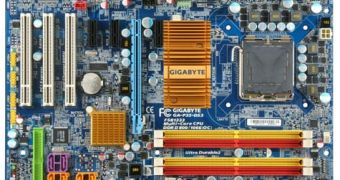Nowadays, most people only think about the performance of a certain product, because the safety part is addressed by organizations that assure you that everything you buy will comply with certain standards. This is also the case of computer parts and one of the standards they have to be in accordance with is the Electromagnetic Interference (aka RFI or radio frequency interference).
All manufacturers that deliver electronic appliances and/or components in USA, the European Union and in most Asian countries have to comply with this standard. The tests associated with it prevent you from getting a piece of electronic equipment that will cause disturbance in a nearby electric circuit or radio receiver. This being the case, I'm sure you grasp the fact that having a PC component causing such an effect will affect one or more of the other parts present in the configuration of your computer.
The culprit, and the subject of this article, is Gigabyte's GA-P35-DS3 motherboard that failed to successfully comply with the EMI tests (tests that where paid by one of Gigabyte's competitors). To be more exact, there where three different mainboards made by the Taiwanese manufacturer that were tested by the Electronic Testing Center in Taiwan and none of them passed the tests.
The fact is that those mainboards being tested weren't official Gigabyte "material" so they have been probably messed with to actually fail the tests. They could have also been from an affected batch of motherboards but, definitely, there are questions to be asked and answers to be given in this case. Where did the motherboards come from? Who paid for the tests?
According to the Inquirer, the first that wrote about this incident, Gigabyte has responded to this situation by sending them a reply that sounded like this:
"All GIGABYTE motherboards undergo rigorous and thorough testing (including EMI testing) before being brought to market. Attached is GIGABYTE official certification for the GA-P35-DS3, where it clearly shows the GIGABYTE GA-P35-DS3 passing all EMI requirements.
It seems a little strange that one of our top selling boards just so happened to have a negative report from the Taiwan ETC several months after the launch of the product. Any motherboard manufacturer or anyone else for that matter can pay to have EMI testing done from ETC. In this case, GIGABYTE has contacted ETC and they have confirmed to us that one of our competitors is actually the one who paid for the testing mentioned in the Inquirer article.
Not to impugn the integrity of the ETC, but any time you have research paid for by a competitor of the study's focus, it does beg the question of how accurate the "report" is. In all fairness, the fact that one of our competitor motherboard manufacturers paid for this report should have been mentioned in the article so readers can make up their own minds as to the accuracy. For example, as mentioned in the article, there is no information in the report about where the motherboard tested came from. Was this a sample purchased from a retail outlet? Were there any modifications made to the board before testing?
Clearly, this is a malicious act by a competitor to negatively impact GIGABYTE motherboard sales, and they have used the Inquirer to do so. Hopefully we can get a retraction or at the very least a clarification as the article has been picked up by several other websites and can have a serious negative impact on our motherboard sales."
From what you can see for yourselves, Gigabyte does have a good point in asking those questions and I've already said that there is a lot of unknown data in this case that might prove Gigabyte's thesis. But there are also the failed tests and this makes one ask: can I trust these tests? Should I choose another manufacturer instead of Gigabyte when buying a mainboard?
At the moment no one knows for sure what the right answer is, so you'll have to decide for yourselves if the tests where taken in correct conditions or not.

 14 DAY TRIAL //
14 DAY TRIAL //